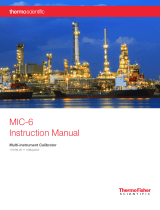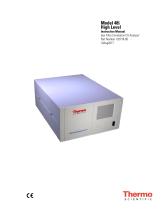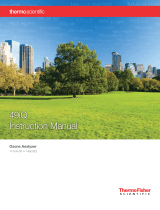Page is loading ...

USEPA Automated Equivalent PM2.5 Method: EQPM-0609-184
Model 5030
Instruction Manual
Synchronized Hybrid Ambient Real-time
Particulate Monitor
Part Number 102017-00
8Jan2013

© 2007 Thermo Fisher Scientific Inc. All rights reserved.
Specifications, terms and pricing are subject to change. Not all products are available in all countries. Please
consult your local sales representative for details.
Thermo Fisher Scientific
Air Quality Instruments
27 Forge Parkway
Franklin, MA 02038
1-508-520-0430
www.thermo.com/aqi

Thermo Fisher Scientific WEEE Compliance
WEEE Compliance
This product is required to comply with the European Union’s Waste
Electrical & Electronic Equipment (WEEE) Directive 2002/96/EC. It is
marked with the following symbol:
Thermo Fisher Scientific has contracted with one or more
recycling/disposal companies in each EU Member State, and this product
should be disposed of or recycled through them. Further information on
Thermo Fisher Scientific’s compliance with these Directives, the recyclers
in your country, and information on Thermo Fisher Scientific products
which may assist the detection of substances subject to the RoHS Directive
are available at: www.thermo.com/WEEERoHS.


Thermo Fisher Scientific Model 5030 SHARP Monitor Instruction Manual v
Preface Section
This manual provides information about operating, maintaining, and
servicing the Model 5030 SHARP Monitor. It also contains important
alerts to ensure safe operation and prevent equipment damage. The manual
is organized into the following chapters and appendices to provide direct
access to specific operation and service information:
● Chapter 1 “Introduction” provides an overview of product features,
describes the principle of operation, and lists the specifications.
● Chapter 2 “Installation” describes how to unpack, setup, and startup
the instrument.
● Chapter 3 “Operation” describes the front panel display, the front
panel keypad, and the menu-driven software.
● Chapter 4 “Calibration” provides the procedures for calibrating the
instrument and describes the required equipment.
● Chapter 5 “Preventive Maintenance” provides a spare parts list and
preventive maintenance procedures to ensure reliable and consistent
instrument operation.
● Chapter 6 “Troubleshooting” presents guidelines for diagnosing
instrument failures, isolating faults, and includes recommended actions
for restoring proper operation. It also includes descriptions of status
messages and reports.
● Chapter 7 “Servicing” presents safety alerts for technicians working on
the instrument, step-by-step instructions for repairing and replacing
components. It also includes contact information for product support
and technical information.
● Chapter 8 “Optional Equipment” describes the optional equipment
that can be used with this instrument.
● Appendix A “Warranty” provides a copy of the warranty statement.
● Appendix B “RS-232 Commands” provides a description of the RS-
232 commands that can be used to remotely control an instrument
using a host device such as a PC or a data logger.
● Appendix C “Connector and Board Schematics” provides the
connector and board schematics for the Model 5030 main circuit
board.

Preface Section
Safety
vi Model 5030 SHARP Monitor Instruction Manual Thermo Fisher Scientific
Review the following safety information carefully before using the analyzer.
This manual provides specific information on how to operate the analyzer,
however, if the analyzer is used in a manner not specified by the
manufacturer, the protection provided by the equipment may be impaired.
This manual contains important information to alert you to potential safety
hazards and risks of equipment damage. Refer to the following types of
alerts you may see in this manual.
Safety and Equipment Damage Alert Descriptions
Alert Description
DANGER A hazard is present that could result in death or serious
personal injury if the warning is ignored. ▲
WARNING A hazard or unsafe practice could result in serious
personal injury if the warning is ignored. ▲
CAUTION A hazard or unsafe practice could result in minor to
moderate personal injury if the warning is ignored. ▲
Equipment Damage A hazard or unsafe practice could result in property
damage if the warning is ignored. ▲
The following symbol and description identify the WEEE marking used on
the instrument and in the associated documentation.
Symbol Description
Marking of electrical and electronic equipment which applies to waste
electrical and electronic equipment falling under the Directive 2002/96/EC
(WEEE) and the equipment that has been put on the market after 13 August
2005. ▲
Service is available from exclusive distributors worldwide. Contact one of
the phone numbers below for product support and technical information
or visit us on the web at www.thermo.com/aqi.
1-866-282-0430 Toll Free
1-508-520-0430 International
Safety
Safety and Equipment
Damage Alerts
W
EEE Symbol
W
here to Get Help

Preface Section
US NRC Exemption
Thermo Fisher Scientific Model 5030 SHARP Monitor Instruction Manual vii
The Model 5030 SHARP Monitor is an exempt product in accordance
with NRC license No. 20-23922-01E and SSD Registration Certificate
No. AVR-1234-D-101-E. The user is exempt from any licensing
requirements for this device. Laws may vary outside of the United States.
Thermo Scientific Model 5030 SHARP Monitor operated for 24-hour
average measurements; including a 1-micron inlet; PM2.5 VSCC ; inlet
connector; sample tube; DHS heater with 35% RH threshold; mass foil kit;
GF10 filter tape; nephelometer zeroing kit; 8-hour filter change; and
operational calibration and servicing as outlined in Model 5030 SHARP
instruction manual.
The following conditions must be followed in order to comply with
USEPA Designation EQPM- 0609-184 for ambient monitoring of PM2.5:
1. Operated for 23-25 hour average measurements.
2. Flow rate set to 1000 L/h (16.67 L/min).
3. Automatic filter change (8-hour cycle time).
4. Automatic filter change when flow rate < 950 L/h.
5. Automatic filter change when sampled filter spot mass is > 1,500 μg.
6. DHS set to 35% RH.
7. Calibrated with zero and span mass transfer foil kit for 0 to 5,000
μg/m3 range.
8. System calibrated for temperature, barometric pressure, and volumetric
flow rate.
US NRC Exemption
USEPA PM2.5 FEM:
EQPM-0609-184

Preface Section
USEPA PM2.5 FEM: EQPM-0609-184
viii Model 5030 SHARP Monitor Instruction Manual Thermo Fisher Scientific
The USEPA method required the SHARP to be installed with the
following Thermo Fisher Scientific hardware:
1. 10-micron omni directional inlet operated at 16.67 Lmin (e.g., Model
SA246b or as specified in 40 CFR 50, Appendix L) with PM2.5
VSCC™.
2. Inlet to sample tube connector.
3. Standard 1-meter heater.
4. SHARP monitor.
5. Pump kit.
6. Glass fiber filter tape.
7. Vertical stabilization of sample tube, as necessary.
8. Nephelometer zeroing kit

Thermo Fisher Scientific Model 5030 SHARP Monitor Instruction Manual ix
Contents
Introduction........................................................................................................ 1-1
Principle of Operation ........................................................................ 1-2
Calculation of Particulate Mass on Filter Tape.................................... 1-3
Calculation of the PM2.5 Concentration with Digital Filter and Fixed
Time Constant................................................................................. 1-5
Activity Concentration of Radon (CRn) Gas ..................................... 1-6
Calculation of Concentration Averages ............................................... 1-6
Specifications ...................................................................................... 1-9
Installation ......................................................................................................... 2-1
Packaging and Transport..................................................................... 2-1
Lifting................................................................................................. 2-1
Unpacking .......................................................................................... 2-1
Acceptance Testing and Startup Procedures ........................................ 2-2
Bench Acceptance Test........................................................................ 2-7
Establishing Monitor Protocol ............................................................ 2-8
Menu Tutorial .................................................................................... 2-9
One-Point Temperature Verification ............................................. 2-12
One-Point RH Sensor Verification................................................. 2-12
One-Point Barometric Pressure Verification................................... 2-13
One-Point Volumetric Flow Rate Verification ............................... 2-13
Nephelometer Zero........................................................................ 2-14
Background Zero ........................................................................... 2-16
24-Hour Zero and Detection Limit ............................................... 2-17
Heated Sample Tube Sensor Calibration........................................ 2-18
Setup and Installation ....................................................................... 2-18
Siting ............................................................................................. 2-18
Heated Sample Tube Lengths ........................................................ 2-19
Rack Mounting.............................................................................. 2-19
Establishing Communications........................................................... 2-22
Analog Output Installation ............................................................ 2-22
Serial Data Communications ......................................................... 2-25
Filter Tape Installation...................................................................... 2-26
Operation ............................................................................................................ 3-1
Operation and Service Menus ............................................................. 3-1
Display............................................................................................. 3-1
Keypad............................................................................................. 3-1
Main User Screen............................................................................. 3-2
Chapter 1
Chapter 2
Chapter 3

Contents
x Model 5030 SHARP Monitor Instruction Manual Thermo Fisher Scientific
Operation Menu .............................................................................. 3-3
Service Menu .................................................................................... 3-12
Mechanical Control ....................................................................... 3-12
Mass Display.................................................................................. 3-13
Hardware and Sensor Diagnosis..................................................... 3-13
Calibration ..........................................................................................................4-1
Equipment Required........................................................................... 4-1
Pre-Calibration ................................................................................... 4-2
Calibration Menu ............................................................................... 4-2
Temperature, RH and Barometric Sensor Calibration...................... 4-2
Sample Flow Rate Calibration.......................................................... 4-4
Automated Detector Adjustment ..................................................... 4-4
Theoretical Adjustment of the High Voltage and the Thresholds..... 4-5
Mass Foil Calibration....................................................................... 4-7
Nephelometer Zero and Calibration ................................................ 4-9
Configuration Menu......................................................................... 4-11
German Networking Protocol........................................................... 4-12
Storing Calibration Values and Operational Parameters.................... 4-12
Reloading from EEPROM................................................................ 4-13
Preventive Maintenance .................................................................................5-1
Spare Parts .......................................................................................... 5-1
Maintaining the Sample Vacuum Pump ............................................. 5-2
Checking the Air Flow ........................................................................ 5-3
Temperature Sensors........................................................................... 5-4
Pressure Sensors .................................................................................. 5-5
Inlet Assemblies................................................................................... 5-6
PM2.5 Impactor Cleaning and Inspection.......................................... 5-6
Cyclone Maintenance....................................................................... 5-7
USEPA PM10 Inlet ........................................................................... 5-8
European PM10 Inlet ........................................................................ 5-9
Weather Proofing........................................................................... 5-10
Leak Test Procedure.......................................................................... 5-10
Troubleshooting.................................................................................................6-1
Safety Precautions ............................................................................... 6-1
Troubleshooting Guides...................................................................... 6-1
Status Messages................................................................................... 6-3
Status Concept and Structure........................................................... 6-4
Warning and Operating Detailed Status Reports.............................. 6-4
Structure of the Status Conception .................................................. 6-5
Detailed Status Messages.................................................................. 6-6
Overlay of Several Status Messages................................................. 6-10
Status Output by Potential Free Relay Contacts................................ 6-11
Chapter 4
Chapter 5
Chapter 6

Contents
Thermo Fisher Scientific Model 5030 SHARP Monitor Instruction Manual xi
Output by Serial Interfaces (COM1 and COM2) ............................. 6-11
Print Formats.................................................................................... 6-12
Status Concepts for Quality-Assured Measurement........................... 6-13
Servicing............................................................................................................. 7-1
Safety Precautions ............................................................................... 7-1
Filter Tape Replacement ..................................................................... 7-2
Carbon Vane Replacement.................................................................. 7-2
Nephelometer and Beta Attenuation Servicing.................................... 7-2
Firmware Update ............................................................................. 7-4
Firmware Update Procedure............................................................. 7-5
Service Locations................................................................................. 7-9
Optional Equipment .......................................................................................... 8-1
Inlet Assemblies................................................................................... 8-1
Sampling Tube Extensions.................................................................. 8-1
Weather Enclosure.............................................................................. 8-1
Rack Mounting Accessories................................................................. 8-1
Warranty ............................................................................................................ A-1
RS-232 Commands ........................................................................................... B-1
Connector and Board Schematics.................................................................C-1
Chapter 7
Chapter 8
Appendix A
Appendix B
Appendix C

Contents
xii Model 5030 SHARP Monitor Instruction Manual Thermo Fisher Scientific

Thermo Fisher Scientific Model 5030 SHARP Monitor Instruction Manual xiii
Figures
Figure 1–1. SHARP Monitor Sample Path.......................................................... 1-2
Figure 1–2. Model 5030 SHARP Flow Schematic.............................................. 1-8
Figure 2–1. Model 5030 Front Panel and Component List................................. 2-3
Figure 2–2. Model 5030 Rear Panel and Component List ................................. 2-4
Figure 2–3. Vacuum Pump Assembly and Connectors....................................... 2-5
Figure 2–4. 1-Meter Heated Sample Tube......................................................... 2-5
Figure 2–5. Roof/Shelter Flange Installation ..................................................... 2-6
Figure 2–6. Zero Test Assembly......................................................................... 2-6
Figure 2–7. Model 5030 Main Circuit Board.................................................... 2-24
Figure 4–1. Theoretical Adjustment of the High Voltage and the Thresholds.. 4-5
Figure 5–1. Location of Pump Parts.................................................................... 5-3
Figure 5–2. Carbon Vane Installation................................................................. 5-3
Figure 5–3. Exploded View of PM2.5 WINS Impactor......................................... 5-6
Figure 5–4. PM2.5 Sharp-Cut-Cyclone ................................................................. 5-7
Figure 5–5. USEPA PM10 Inlet............................................................................. 5-8
Figure 5–6. European PM10 Inlet......................................................................... 5-9
Figure 7–1. Pump Parts Location........................................................................ 7-3
Figure 7–2. Carbon Vane Installation................................................................. 7-3
Figure 7–3. Communications Cable Wiring Diagram and Serial Connection.... 7-4

Figures
xiv Model 5030 SHARP Monitor Instruction Manual Thermo Fisher Scientific

Thermo Fisher Scientific Model 5030 SHARP Monitor Instruction Manual xv
Tables
Table 1–1. Model 5030 Specifications............................................................... 1-9
Table 2–1. EU and US Monitoring Protocols...................................................... 2-9
Table 3–1. Model 5030 SHARP Parameter List.................................................. 3-6
Table 3–2. Parameter Change List...................................................................... 3-7
Table 5–1. Recommended Spare Parts .............................................................. 5-1
Table 6–1. Troubleshooting Guide...................................................................... 6-1
Table 6–2. Warning Status Report..................................................................... 6-5
Table 6–3. Operating Status Report................................................................... 6-5
Table 6–4. Global Error Status............................................................................ 6-7
Table 6–5. Data and Program Memory .............................................................. 6-8
Table 6–6. Sampling and Measuring System .................................................... 6-8
Table 6–7. Pressure Sensors .............................................................................. 6-9
Table 6–8. Air Flow Regulation .......................................................................... 6-9
Table 6–9. Sample Heater .................................................................................. 6-9
Table 6–10. Temperature Measurement.......................................................... 6-10
Table 6–11. Nephelometer Measurement ....................................................... 6-10
Table 6–12. Detailed Error Status and Global Error Status ............................. 6-10
Table 8–1. Optional Equipment Parts List .......................................................... 8-1

Tables
xvi Model 5030 SHARP Monitor Instruction Manual Thermo Fisher Scientific

Thermo Fisher Scientific Model 5030 SHARP Monitor Instruction Manual 1-1
Chapter 1
Introduction
The Model 5030 Synchronized Hybrid Ambient Real-time Particulate
(SHARP) Monitor is a hybrid nephelometric/radiometric particulate mass
monitor capable of providing precise, one-minute, real-time measurements
with a superior detection limit. The SHARP Monitor measures the mass
concentration of ambient PM10, PM2.5, and PM1.0 aerosol in real-time. The
SHARP monitor incorporates a high sensitivity light scattering photometer
whose output signal is continuously referenced to the time-averaged
measurements of an integral beta attenuation mass sensor. This system
achieves heretofore-unattained short-term precision and accuracy. The
SHARP monitor incorporates advanced firmware to optimize the
continuous mass calibration of the nephelometric signal, ensuring that the
measured mass concentration remains independent of changes in the
particle population being sampled.
The SHARP monitor incorporates a dynamic heating system (DHS)
designed to maintain the relative humidity of the air passing through the
filter tape of the radiometric stage well below the point at which the
collected particles accrete and retain liquid water. This DHS system
minimizes the internal temperature rise ensuring negligible loss of semi-
volatiles from the collected sample when the ambient relative humidity is
below the threshold to which the heater is controlling. As the ambient RH
increases above the threshold, the applied heating is optimized to maintain
the RH threshold above the beta attenuation filter tape. The purpose of
this heating system is specifically designed to force the continuous mass
monitor to agree with the gravimetric reference method and the relative
humidity conditions to which the reference filter samples are conditioned.
Furthermore, sufficient flexibility is provided within the firmware to
configure the heating conditions to satisfy global monitoring protocols.
The Model 5030 has the following features:
● Multi-line alphanumeric display
● Menu-driven firmware
● Field programmable logging averages
● Analog output
● High sensitivity

Introduction
Principle of Operation
1-2 Model 5030 SHARP Monitor Instruction Manual Thermo Fisher Scientific
● Excellent linear response
● Mitigation of aerosol artifacts
● Long-life optics, detectors, and beta source
● Automatic temperature and pressure compensation
● Internal quality assurance and data storage features
Thermo Fisher Scientific is pleased to supply this continuous aerosol mass
monitor. We are committed to the manufacture of instruments exhibiting
high standards of quality, performance, and workmanship. Thermo service
personnel are available for assistance with any questions or problems that
may arise in the use of this analyzer.
The Model 5030 is based on the principles of aerosol light scattering
(nephelometer) and beta attenuation to measure precise and accurate
ambient aerosol concentrations. The Model 5030 aerosol sample pathway
is shown in Figure 1-1.
Figure 1–1. SHARP Monitor Sample Path
Principle of
Operation
Conditioned Aerosol Sample To Vacuum Pump
Nephelometer
Beta Attenuation

Introduction
Calculation of Particulate Mass on Filter Tape
Thermo Fisher Scientific Model 5030 SHARP Monitor Instruction Manual 1-3
The SHARP optical assembly senses the light scattered by the aerosol
passing through an 880 nm illumination beam. The nephelometry response
is linear with aerosol concentration; independent of sample flow rate; and a
running one-minute average and dynamic average are continuously
calculated. Within the base of the optical assembly, a relative humidity
(RH) sensor is located immediately upstream of the sample filter-tape
assuring a representative measurement of the aerosol conditioning prior to
real-time mass determination.
Thereafter, the aerosol is deposited onto a glass fiber filter tape. The filter
tape will accumulate an aerosol sample towards a threshold value,
whereupon the filter tape will automatically advance prior to reaching
saturation. During the collection of aerosol onto the filter tape the SHARP
Monitor uses the radiometric principle of beta attenuation through a
known sample area to continuously collect and detect the deposited mass.
Additionally, the beta-attenuation chamber measures alpha emissions from
the accumulated aerosol and excludes negative mass artifacts due to the
presence of daughter nuclides from radon gas decay to achieve a “refined
mass” measurement. Simultaneous refined mass measurements of sampled
aerosol on the filter tape and sample volume measurement through a
calibrated orifice provide a continuous concentration measurement of the
ambient mass concentration. The collected sample temperature is measured
within the attenuation chamber.
The beta detector of the 5030 SHARP delivers a count rate, which is
proportional to the intensity of the beta beam. The mass is calculated from
this count rate according to the following equation :
⎟
⎟
⎠
⎞
⎜
⎜
⎝
⎛
−−
∗=
∑)(*
ln
0
/
0
ααβ
β
αβ
nn
cal
n
nn
F
Fm
where;
Σ
mn = mass loading in micrograms [μg],
β
0 = background β count rate with an unloaded filter [1/s],
β
n = the gross count rate with a loaded filter [1/s],
Fcal = mass foil calibration factor in micrograms [μg],
Fβn/αn = global natural β : α count rate ratio ≈ 3.5
αn = the gross α count rate of natural aerosol radioactivity [1/s], and
αo = background α count rate [1/s]
Calculation of
Particulate Mass
on Filter Tape

Introduction
Calculation of Particulate Mass on Filter Tape
1-4 Model 5030 SHARP Monitor Instruction Manual Thermo Fisher Scientific
The theoretical calibration factor (Fcal) is given by:
gmg
A
Fcal
μ
ρμ
600,6*
3.02
/≈==
where;
A = filter spot area (cm2), and
μ/ρ = mass attenuation coefficient for 14C [cm²/mg]
For continuous beta compensation during changing temperature and
pressure, the following equation is applied:
(
)
)]*()*()*[(1 332222 PkPkTk pPTRn
Δ
+
Δ
−
Δ
−×=
β
β
where;
β
n = compensated beta count [1/s],
β
R = raw beta count [1/s],
Δ
T2 = T2 – T2o, change in sample temperature since filter change (oC)
Δ
P2 = P2 – P20 , change in vacuum under filter tape since filter change (hPa),
Δ
P3 = P3 – P30, change in barometric pressure since filter change (hPa),
kT2 = temperature coefficient,
kP2 = sub-filter pressure coefficient
kP3 = barometric pressure coefficient
/









